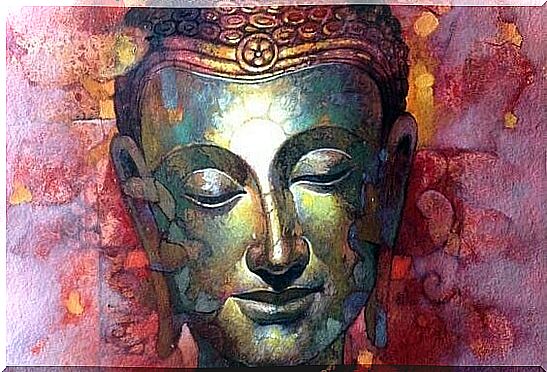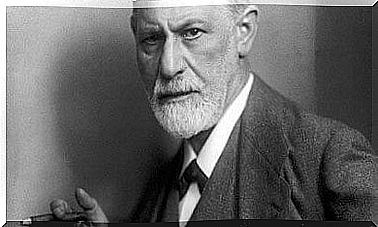9 Phrases From Buddhism To Find Inner Peace

The phrases of Buddhism contain something more than the essence of a religion. His refined and always cathartic approach helps us to work on mental states and promote a kind of happiness based on balance, inner calm and humility. Thus, his ancestral techniques based on meditation, mindfulness, and emotional regulation are very useful in the field of psychology today.
Anyone who has read about Buddhism knows that its ancient heritage is full of traditions and spirituality. Since Gautama Buddha enunciated his teachings in the sixth century BC, the wisdom compendium has been transformed in many inconspicuous ways to adapt to today’s needs.
Furthermore, it is not necessary to practice this non-theistic doctrine of the dharmic family to benefit from these pillars that contribute so much to our personal growth. Today, there are many psychological approaches that nurture the roots of this philosophical legacy. Its practices were taken up by a part of Western psychology and mediated in a variety of processes with which to facilitate from emotional management to self-control, or even avoid relapse after overcoming depression.
Finding inner peace through the phrases of Buddhism, its practices and its traditions is possible. According to Dr. Alan Wallace, one of the scientists and philosophers who was most dedicated to the study of Buddhism and its usefulness in clinical practice, this type of philosophy is one that can help us deactivate our negative or catastrophic thoughts. Therefore, we are sure that these phrases will be of great help to us.

Buddhism phrases for everyday life
There are many and varied books where you can find these little gifts of wisdom that put their essence in these sentences. However, it can be said that many reliable biographical references about the Buddha himself are not available until now, so that everything we know about his person and his religion comes from three very concrete sources: that of the vinaia, the Suta Pitaca and the buddhacarita of Asvaghosa.
It is through these texts that a large part of his philosophical and spiritual doctrine was erected, the same one that shapes these inspiring phrases of Buddhism.
1. Find a purpose in life
A purposeless person is like a wandering soul who lets himself be carried away by the vagaries of life. Human beings need to have vital goals, objectives and purposes with which to find the meaning of their days, motivating themselves to get up in the morning with energy to surpass themselves even more.
2. Working on negative emotions
As we said at the beginning: One of the great uses of Buddhism in psychotherapeutic practice is its usefulness in detecting and raising awareness of the negative thoughts and emotions that surround our daily balance.
Unmanaged anger , the one that takes over our minds and makes us suddenly explode, is useless. Plus, all that negative emotion always takes a trip back. In the end, we end up hurting ourselves and losing those we love the most.

3. The here and now is the only thing that matters
The importance of focusing on the here and now is one of the great statements of mindfulness , the mindfulness- based strategy closely related to Buddhism.
We’ve all heard it more than once, it’s been recommended to us and we’ve tried to do it: we should focus more on the present. However, it is difficult, because our lifestyle is based on the immediate future and the goals to be fulfilled in which all our worries are concentrated.
We will try; take a deep breath and calm your mind: enjoy everything that happens in the now.
4. Self-control, the key to happiness
A disciplined mind is one that knows how to practice self-control, that prioritizes what is important. A mind that puts aside what is not useful, what is meaningless and has learned to focus on positive emotions to enjoy real but humble happiness.
5. Attachment is our source of suffering
The harmful bond, the one that makes us attached to others, that makes us dependent on consumerism or material, is a common virus in today’s society.
Getting rid of it, that root that brings more suffering than satisfaction, takes time and requires wisdom. Learn to be more free, practice detachment and walk lighter, more in tune with your own life and your own being.

6. I understand you, you are part of me, I am with you
This is one of the most beautiful phrases in Buddhism. True love is not based on blind passion or the harmful addiction referred to. Love is, above all, knowing how to care and understand. Because those who understand have the courage and willingness to approach the soul of the other to make them see that they are present, that they understand what the other person feels and thinks. It’s an unconditional approval that we all deserve to enjoy.
7. You are your own enemy
The worst enemy, the most voracious and destructive, is not around us. He doesn’t wear shoes, makes no noise when walking, or has a deep voice. Also, your tone of voice is very familiar to us because it’s us. We are the worst jailer, the worst judge and the worst executioner, the one who takes our wings and raises worries.
8. Constancy and perseverance
This is one of the most useful phrases in Buddhism for achieving our goals in life. So, something as simple as being constant in our efforts, persevering in the pursuit of our desires, despite the difficulties, will allow us to achieve much more than we think.
Now, to achieve what we are looking for, sometimes great actions or great efforts are not necessary; That little gesture of each day is enough, that little that every day makes up a dazzling mountain to reach the top.

9. Speak smartly
Buddhism reminds us that human beings tend to have a flaw: they don’t speak intelligently. We often talk about rancor, frustration, or that negative emotion that holds us back, and this is projected onto others.
Avoid this language full of hollow words, those that don’t contribute anything, that hurt, or that don’t bond. Let’s use the wisest, simplest, most profound words, the ones that bring peace and balance.
To conclude, we know that there are several phrases from Buddhism that deserve to be reflected here. Many of us may even have our favourites, however the ones that have been listed here serve a very specific purpose: finding inner peace, managing negative emotions, focusing on the present moment.
Let’s learn from them; let’s make them our daily standards to live in greater balance and with greater happiness.








